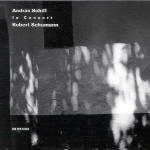The prospect of three of Schumann’s less popular large-scale works on one recital is tantamount to dining on three thick, meaty, and utterly delicious porterhouse entrées at a single bound. András Schiff programs the Humoreske first, the Sonata No. 3 (a.k.a. the Concerto Without Orchestra) last, and places the eight Op. 21 Noveletten in the middle, with an intermission halfway. That’s a lot of music to digest in one gulp, yet Schiff’s penetrating musicianship, firm yet flexible sense of architecture, and diversified pianistic portfolio of colors, articulations, voicings, and pedalings command your undivided attention.
He “orchestrates” the Humoreske’s textural thickets in leaner yet more purposefully projected brush strokes than in his admirable 1976 Denon recording. At first hearing, Schiff’s pronouncedly clipped approach to Schumann’s obsessive chordal sequences in dotted rhythms seems a trifle arch and affected in the Novelletten. Further listening, however, reveals the pianist’s subtle and enlivening adjustments of timbre and hand balances, particularly in the second and eighth pieces.
These qualities also help sustain the Sonata’s rambling outer movements, together with Schiff’s sixth sense for when to push the music ahead and when to linger. In contrast to Pollini’s DG recording, Schiff opts for Schumann’s later, four-movement edition, although he adheres to the first movement’s earlier text. The reflective Op. 23 No. 4 Nachtstücke serves not so much as an encore as a benediction to this beautifully engineered and thoughtfully annotated release. No Schumann lover nor András Schiff fan should miss it.
































